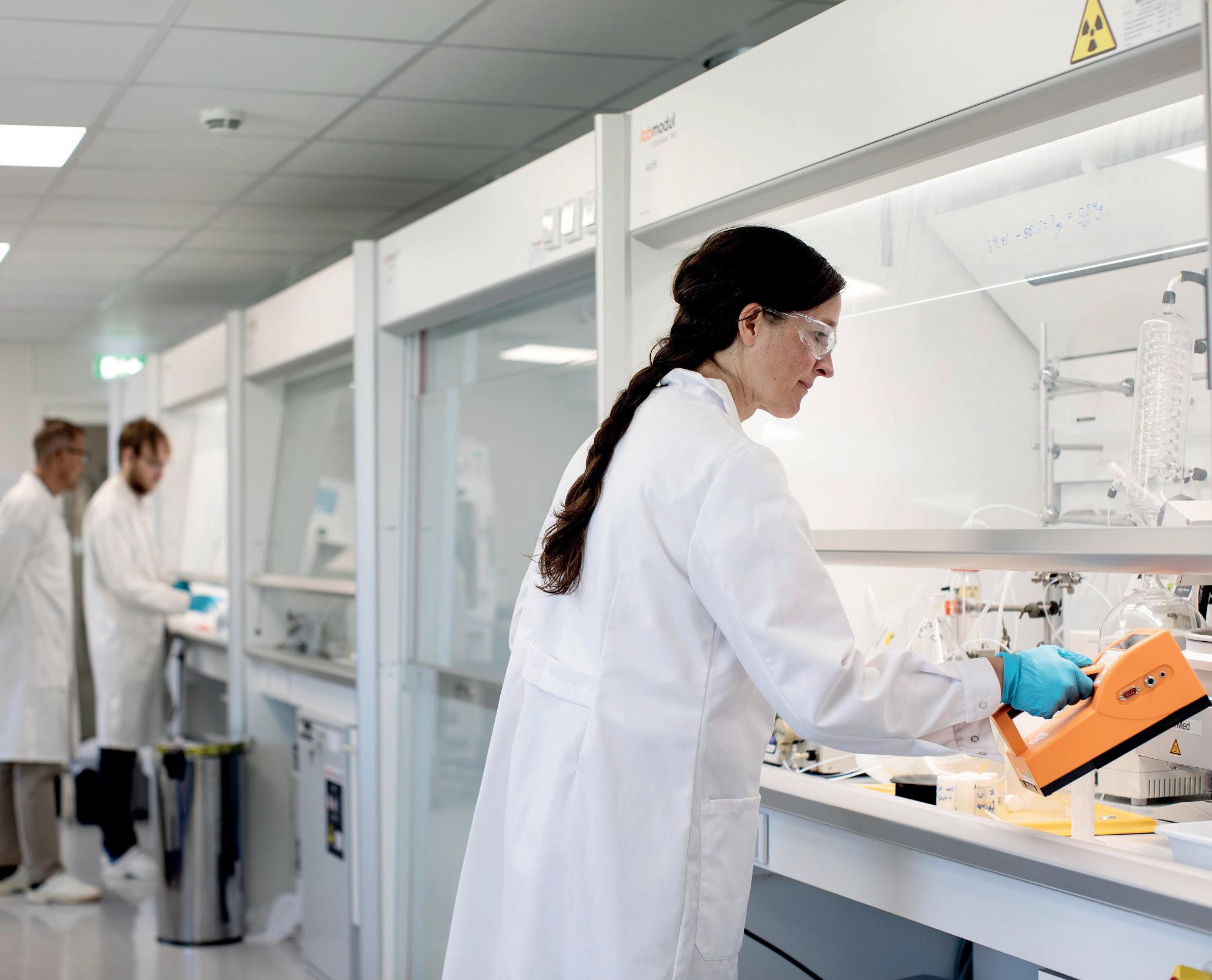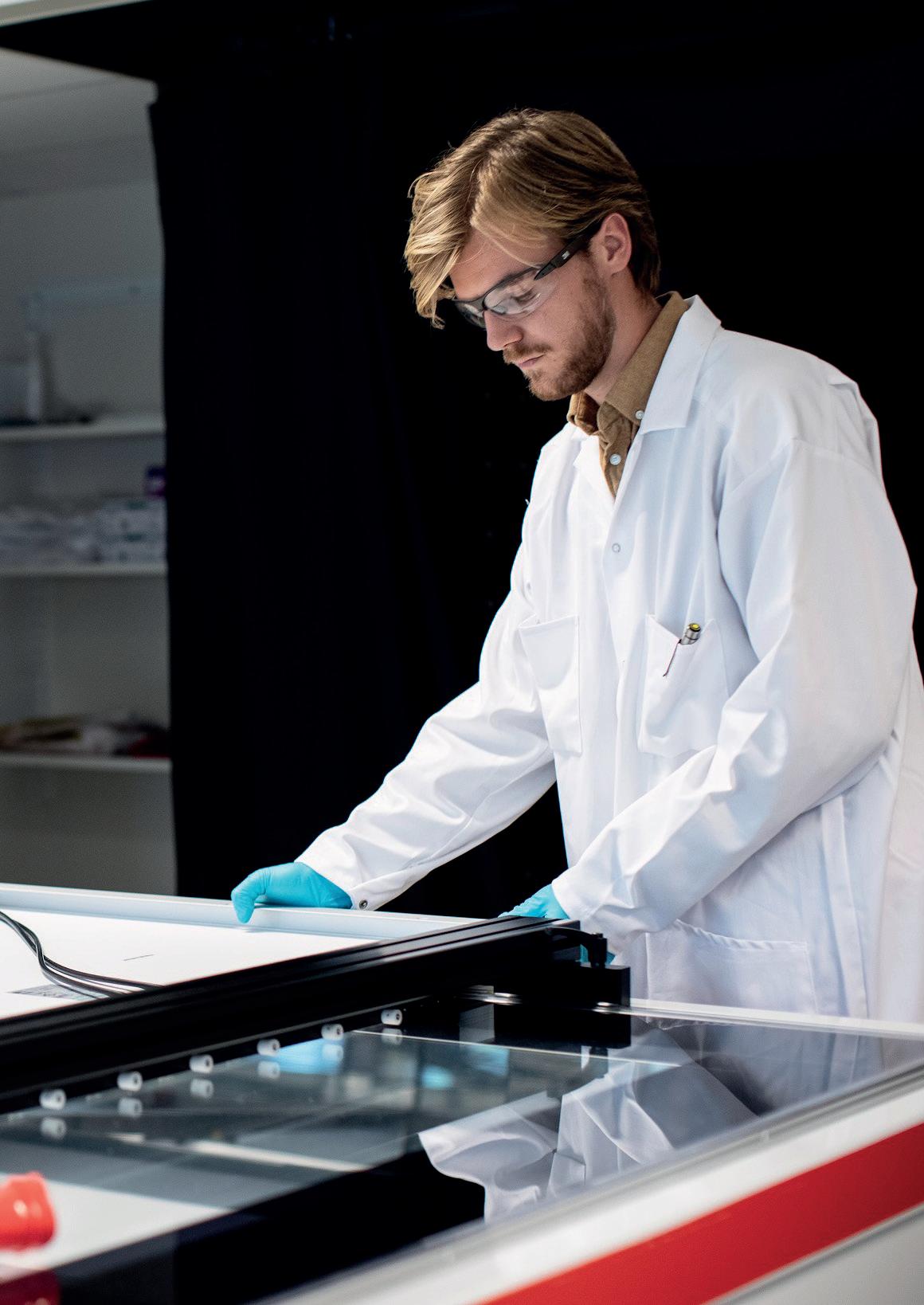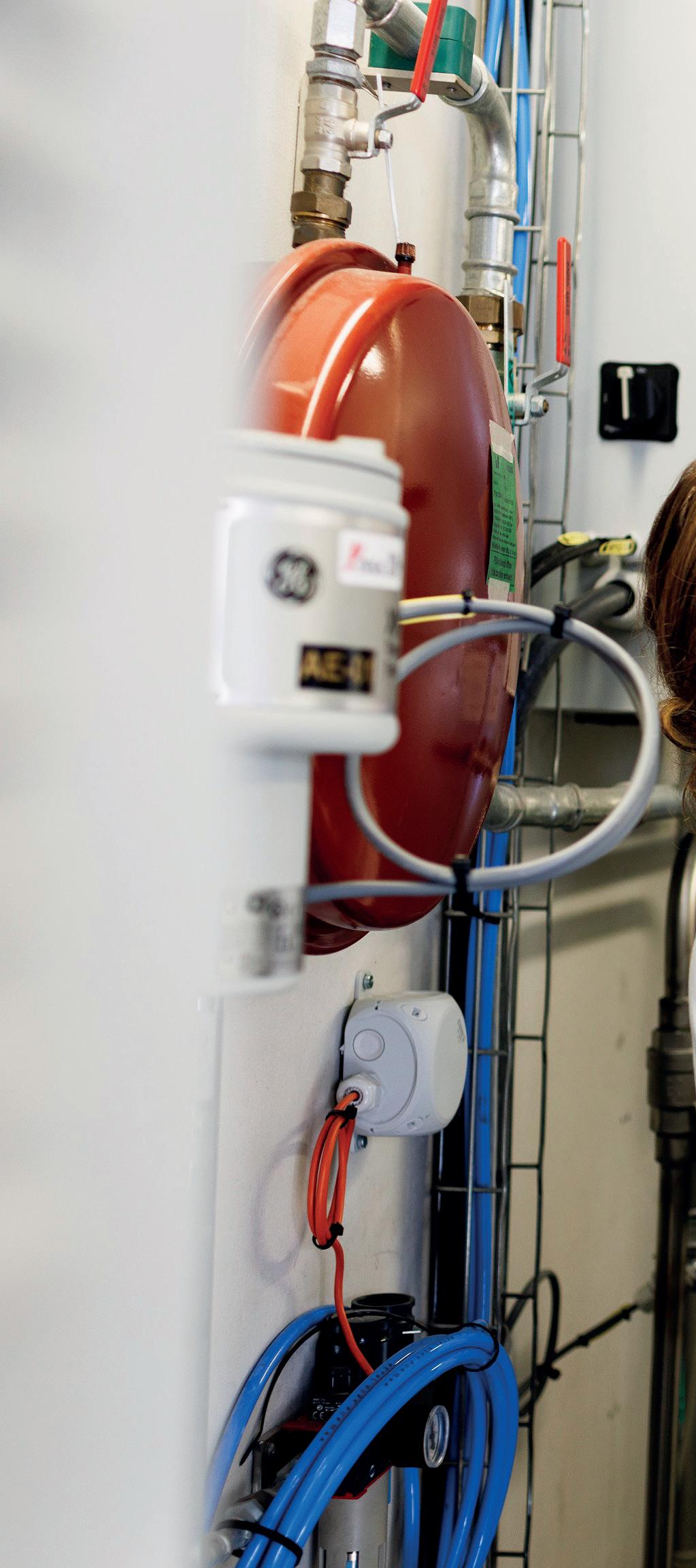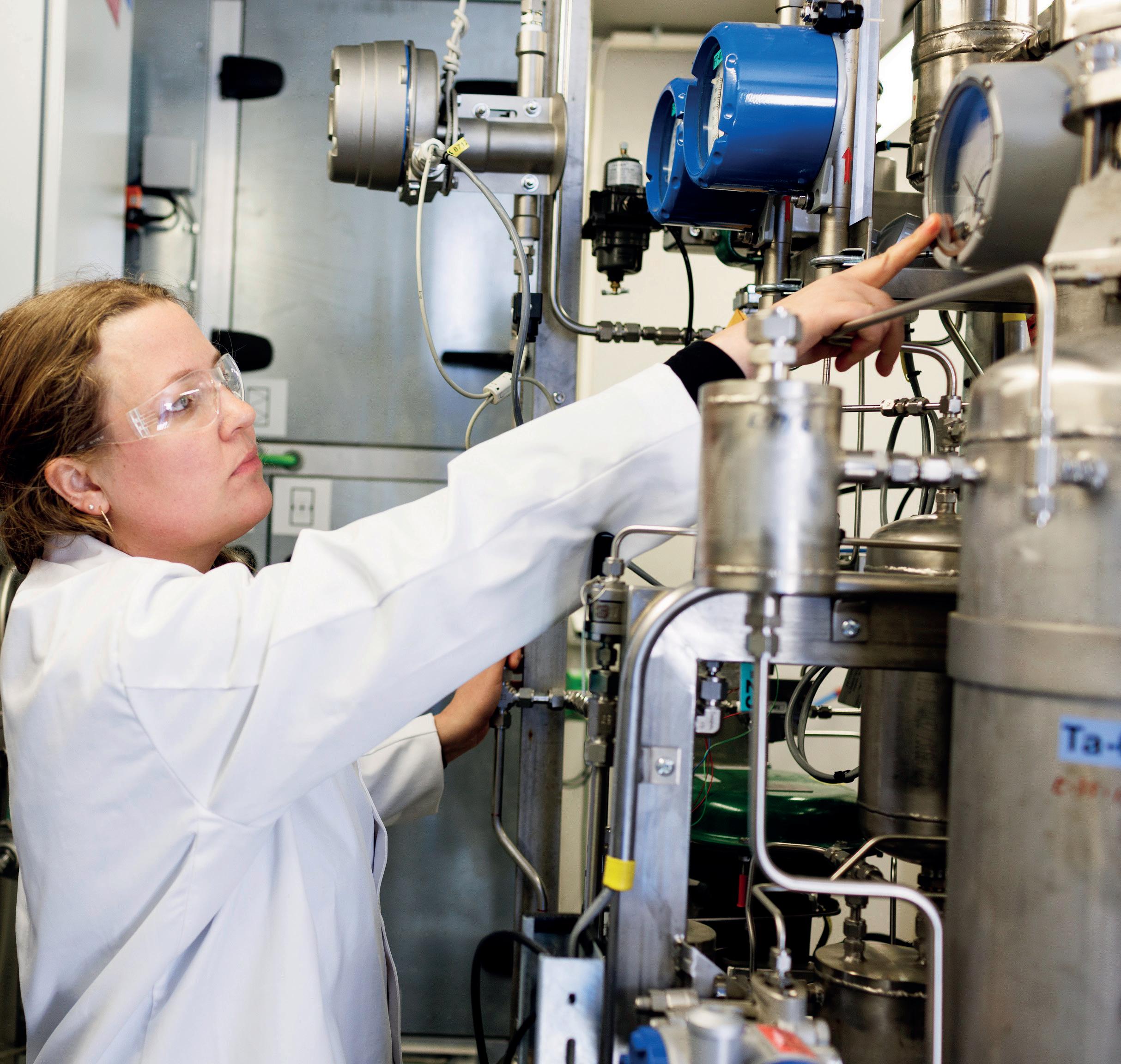Research for a better future Sustainability Strategy





The Institute for Energy Technology (IFE) pursues a range of activities related to research and development (R&D), radiopharmacy, operation and safety of nuclear facilities, and real estate. The Sustainability Strategy supplements IFE’s main strategy and sets out IFE’s governing strategic priorities and principles for all sustainability work in IFE. IFE’s Sustainability Strategy seeks to strengthen IFE’s ongoing efforts on sustainability and to enhance sustainability in all our operations and priorities. Environmental, social and governance aspects are included in IFE’s work on sustainability.
IFE’s vision is “Research For a Better Future”, and our values are “Passion, Creativity and Integrity”. As an independent research foundation, we need to be profitable to be able to invest in research facilities and competence. IFE is a leading research institute with two research divisions: Energy and environmental technology, and Digital systems.
IFE has a division for Nuclear operations and safety, a division for Real Estate, a division for Radiopharmaceuticals1 and a central staff. IFE will have two operating subsidiaries from 2023, IFE Invest AS and Agilera Pharma AS.
The Sustainability Strategy applies to all employees in IFE and IFE Invest AS. Agilera Pharma AS will have its own sustainability strategy. IFE’s Board of Directors has adopted this strategy, and IFE’s management have the responsibility to ensure compliance with this strategy. The Sustainability Strategy forms the basis for all operations at IFE and shall be supplemented by division-specific priorities and annual targets on sustainability.
Society is facing greater global challenges than ever before with respect to the climate, the environment, energy, health and safety. IFE acknowledges that our business may impact the environment and the people that we directly or indirectly interact with, and that we have a responsibility to conduct business in a diligent, respectful and decent manner.
IFE’s main strategy refers to sustainability as a core value that shall guide all IFE’s operations. We are committed to conducting research for a better future in collaboration with our clients and partners. The UN Sustainability Development Goals (SDG) form a basis for our strategy, which is also influenced by the EU’s aim of focusing research and innovation on finding solutions to global societal challenges.
IFE has since 1948 been a frontrunner in energy research, and we are committed to contribute to the green transition necessary to achieve the global and EU-goals of climate neutrality, decarbonization of energy and securing energy access for all. IFE is also committed to play an important role in our local community, by being a decent and responsible employer, business participant, contributor to local green infrastructure and value creator.
With our sustainability strategy, we aim to reach further to contribute to a more sustainable world,
both for our planet and for our people. We strive to implement sustainability in all our operations and in our day-to-day business, with respect for fundamental human rights and decent labour conditions throughout our value chain and to be a good workplace for all our employees. IFE will strive to leverage and enhance the competencies and know-how of our employees with the objective of increasing responsible and sustainable behaviour and decisions in daily activities and communication.

The UN's Sustainable Development Goals, the UN Guiding Principles for Business and Human Rights, and the EU Sustainable Growth Action Plan will guide our work on sustainability.
IFE is subject to a wide range of sustainability regulatory framework. IFE has a management system that defines roles and responsibilities within the organisation, as well as guidelines and systems that ensure compliance with these regulations. Through our risk analysis, we have identified the main sustainability risks associated with our business and operations. The risks are particularly addressed in our work on sustainability.
Because IFE handles radioactive substances, as well as toxic and explosive gases and chemicals, we must comply with strict requirements for emissions and waste, established and supervised by various authorities. IFE has internal guidelines and procedures to ensure compliance with these requirements, including ethical guidelines, purchase guidelines, well-established HSE and HR-routines and routines for safety, security, and transparency. IFE works constantly to comply with the requirements and to minimize our impact on the environment surrounding us.
IFE is met with high expectations on sustainability from a wide range of stakeholders. This includes expectations from employees, customers, partners, and authorities.
As a foundation and research institute, IFE cooperates closely with public institutions that place high demands on sustainability and ethics. These expectations reflect a constantly increased focus on sustainability and ethics, and strongly influence IFE’s sustainability ambitions.
IFE has carried out a risk and materiality analysis. This analysis is intended to ensure that IFE's work on sustainability prioritizes the areas where IFE has the greatest negative impact on the environment, climate, and the people - and thereby the highest risk. It also points out the areas where IFE has the greatest opportunity to make a positive difference. The analysis forms the basis for IFE’s sustainability ambitions and objectives.
IFE's highest emissions and environmental residual risks are radioactive waste, emissions of gas, CO2 emissions from transport and travel activities, energy consumption for real estate and operations, and energy consumption related to technology and
Working with sustainable innovations requires not only more employees, but also the design and construction of new and specialized laboratories

computing. IFE continues to strive to improve its overview and knowledge of indirect climate and environmental footprint, i.e., impacts on climate and the environment originating from IFE's suppliers and other partners that IFE receive services from.
IFE continues to raise awareness on ethical business and social safeguards. Transparency is a prerequisite for IFE's safety culture and is clearly expressed from
the top of the organization. IFE continues to strive to ensure control and traceability of our supply chain as to ensure responsible business conduct throughout our business operations.
Strengthening our efforts will enable IFE to meet the expectations that customers, partners, authorities, and not least our employees, have to IFE.
IFE is committed to work for a more sustainable future and will direct our strategic decisions toward targeted sustainability objectives. Our sustainability objectives are based on the risks identified as associated with our business. Our strategic priorities will be to target areas with the greatest opportunity to impact positively.
IFE’s main contribution to sustainability is research in energy, environment and digital systems. IFE aims to be a key driver for a resilient, fair, and sustainable society throughout our research. We will continue our efforts to develop sustainable solutions for global and national challenges in partnership with our clients.
In IFE’s business conduct, we will proactively work to achieve the following sustainability ambitions:
• IFE shall act responsibly, ethically, and inclusively, consider our surroundings and ensure respect for equality and fundamental human rights.
• IFE shall actively contribute to increased sustainability and be at the forefront among its peers regarding promotion and adoption of sustainable solutions. The measures adopted for this aim shall be knowledgebased, verifiable and proportionate.
• IFE shall actively work to reduce the sustainability risk in our business. Business areas with high sustainability risk (environmentally, financially and reputationally) shall adopt targeted measures and follow-up.2
• IFE shall have guidelines for assessing partners, as well as purchasing products and services based on sustainability. IFE will follow up suppliers, contractors, and partners as part of our sustainability work.
• IFE will reduce our direct climate footprint and actively work to reduce our indirect climate footprint, proportionately based on the level of activity.
• IFE shall develop and deploy sustainable solutions and operations for our property and buildings and use these as test arenas for the research activities to develop sustainable solutions.
• Safety and security for our employees and surroundings will always be IFE's top priority.
• IFE respects diversity and works actively to prevent discrimination because of gender, disability, ethnicity, national origin, skin colour, religion or outlook on life.
2 For IFE’s nuclear operations it might be necessary to engage in dialogue with relevant authorities and stakeholders.

IFE’s clear ambition is to implement the strategy in all parts of our organization and in our dayto-day-business, and overall responsibility for sustainability is represented in IFE's top management team.
IFE is committed to achieve our sustainability objectives for actual impact, and will prioritize the following implementing measures:
• IFE shall integrate sustainability in our management system
• IFE shall set annual goals and KPIs for sustainability
• IFE shall annually and openly report on our sustainability work, carbon footprint, key risks, challenges, and achievements, with a focus on risk exposure, materiality, and quantitative information
• IFE shall implement methodologies for estimating sustainability impact in our research applications and projects, and communicate the impact to clients and issuers of research grants
• IFE shall conduct training of employees and managers to raise awareness and ensure compliance in the organization of our sustainability objectives

 IFE Hynor Hydrogen Technology Center (IFE Hynor) is a fuel cell and hydrogen technology test center owned and operated by IFE. The new IFE Hynor laboratories also contain a laboratory setup for production and experimental work with liquid hydrogen (LH2).
IFE Hynor Hydrogen Technology Center (IFE Hynor) is a fuel cell and hydrogen technology test center owned and operated by IFE. The new IFE Hynor laboratories also contain a laboratory setup for production and experimental work with liquid hydrogen (LH2).
